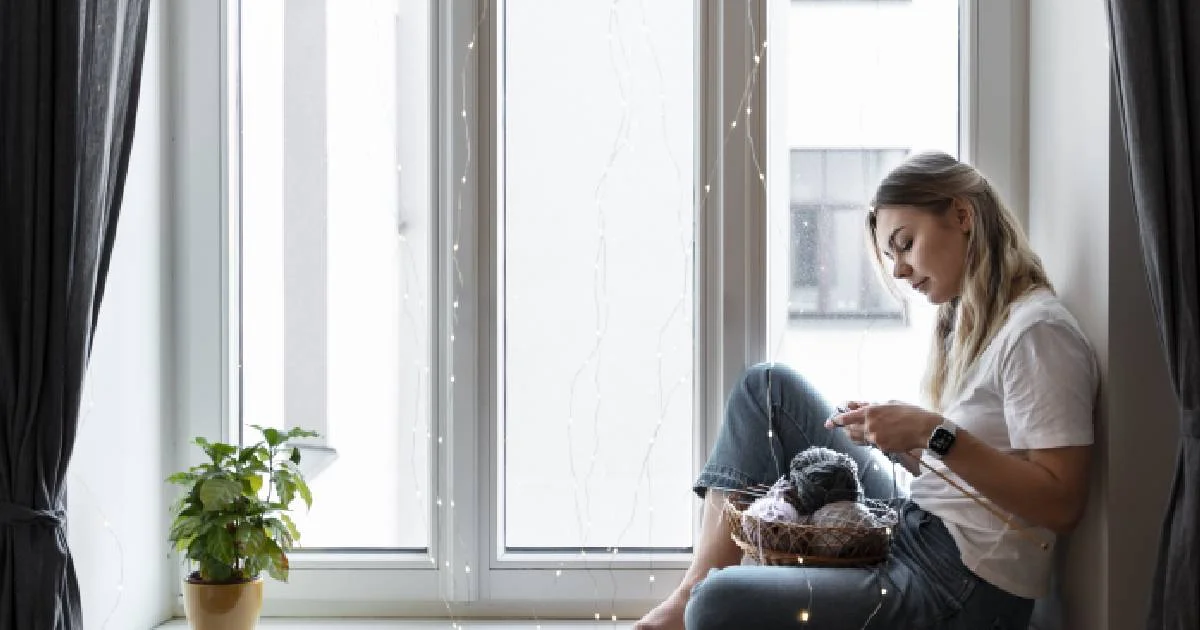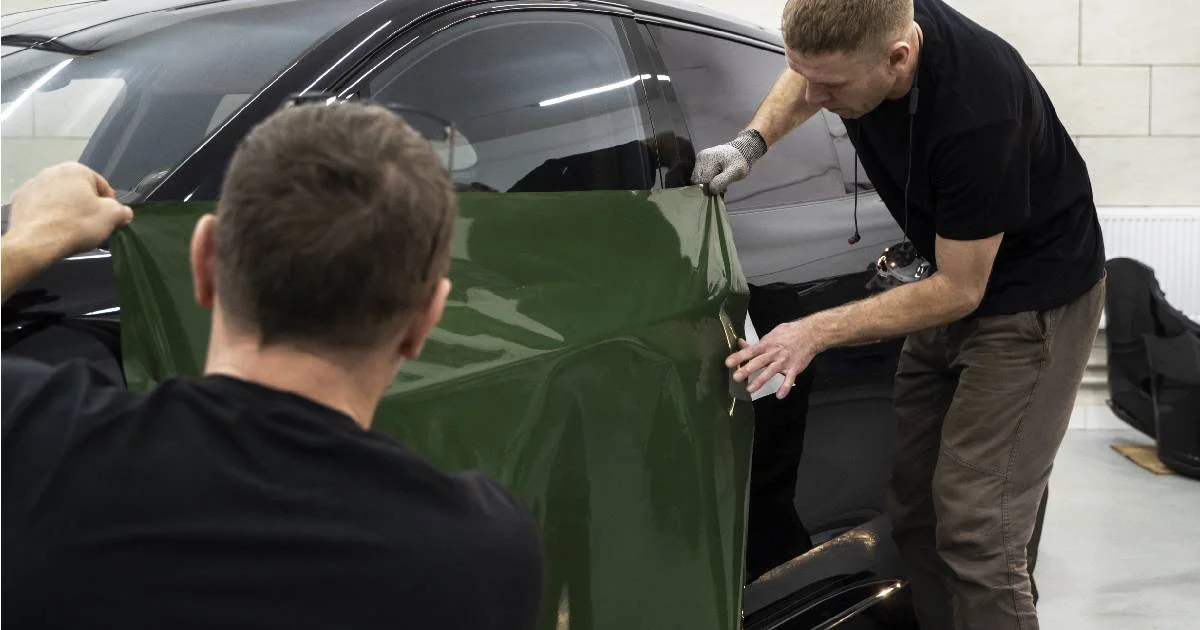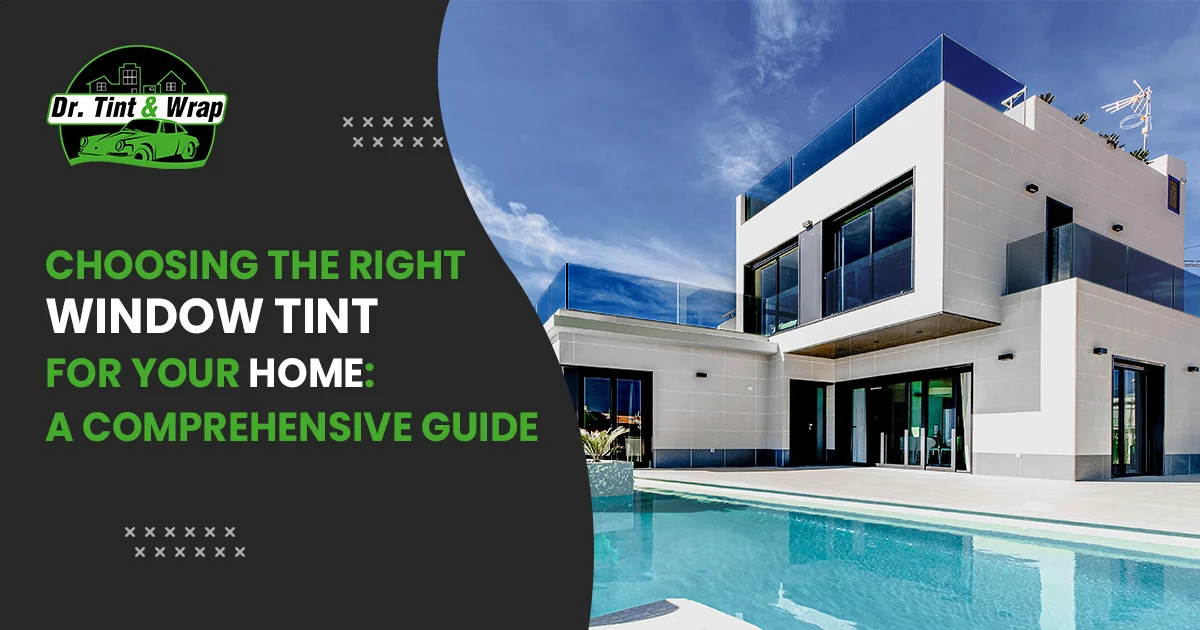
Enhance Your Privacy and Security with Home Window Tinting
23 Dec 2023, By AdminIntroduction
Home Window Tinting is a process where a thin film is applied to the windows of a residence to reduce the amount of visible light, UV rays, and heat that enters the interior. This tinting film is typically made of polyester and can come in various shades. The primary purpose is to enhance privacy and security by limiting the view into your home from the outside.
What is Home Window Tinting, and how does it enhance privacy and security?
Home Window Tinting is a process where a thin film is applied to the windows of a residence to reduce the amount of visible light, UV rays, and heat that enters the interior. This tinting film is typically made of polyester and can come in various shades. The primary purpose is to enhance privacy and security by limiting the view into your home from the outside.
How does Home Window Tinting contribute to privacy at home?
Home Window Tinting provides an additional layer of privacy by obstructing the view into your home. It allows you to enjoy natural light without compromising your privacy, making it difficult for outsiders to see the interiors of your house. This is especially beneficial for ground-level windows and homes in close proximity to neighbors or busy streets.
Can Home Window Tinting protect against harmful UV rays?
Absolutely! One of the significant benefits of Home Window Tinting is its ability to block a significant portion of harmful UV rays. This not only helps in safeguarding your skin from potential damage but also prevents fading and deterioration of your furniture, flooring, and other belongings due to prolonged exposure to sunlight.
How does Home Window Tinting contribute to energy efficiency?
Home Window Tinting can help regulate the temperature inside your home by reducing the amount of heat that enters through the windows. This means less reliance on air conditioning during hot days, resulting in energy savings. It acts as an insulator, keeping your home cooler in the summer and warmer in the winter, thus contributing to overall energy efficiency.
Are there different types of window tinting available for homes?
Yes, there are various types of Home Window Tinting films available. These include reflective, dyed, and ceramic films. Reflective films are excellent for blocking heat, while dyed films are more for privacy. Ceramic films, on the other hand, offer a good balance between heat rejection and maintaining natural light.
How does Home Window Tinting enhance security?
Home Window Tinting enhances security by adding an extra layer of protection to your windows. The film makes it more difficult for burglars to see inside your home, making it less likely that they will attempt a break-in. Additionally, the film can hold shattered glass together in case of breakage, reducing the risk of injury and making it harder for intruders to gain access.
Does Home Window Tinting require special maintenance?
Home Window Tinting is relatively low maintenance. Cleaning the tinted windows is similar to cleaning regular windows—mild soapy water and a soft cloth are usually sufficient. However, abrasive cleaning materials should be avoided to prevent damage to the tinting film. Regular cleaning helps maintain the effectiveness and appearance of the tinting over time.
Enhancing privacy and security through Home Window Tinting is a practical and effective solution for homeowners, offering a range of benefits beyond just aesthetic appeal. By considering the type of tinting film and hiring professionals for installation, you can create a more comfortable and secure living environment for your family.
In conclusion, home window tinting is a versatile solution that offers a range of benefits beyond aesthetics. From enhancing privacy and security to protecting against UV rays and improving energy efficiency, the advantages are numerous. Consider investing in home window tinting to create a secure, comfortable, and energy-efficient living space that aligns with the demands of the modern world. Take the first step towards transforming your home into a haven of privacy and security by exploring the possibilities of home window tinting today.

Understanding the Legal Aspects of Car Window Tinting in Tauranga
23 Dec 2023, By AdminCar window tinting has become a popular choice for vehicle owners in Tauranga, offering various benefits such as enhanced privacy, protection against harmful UV rays, and improved aesthetics. However, it is important to understand the legal aspects surrounding car window tinting to ensure compliance with local regulations. In this blog post, we will delve into the legal guidelines for car window tinting in Tauranga and provide you with valuable information to make informed decisions.
1. Familiarize Yourself with the Regulations
Before diving into car window tinting, it's crucial to be aware of the specific legal requirements in Tauranga. Each region may have its own set of regulations, so it's important to research and understand the guidelines specific to this area. Familiarize yourself with the allowable levels of tint darkness and reflectiveness to ensure compliance.
2. Light Transmission Laws
One of the key factors in car window tinting regulations is light transmission, often measured as a percentage. The lower the percentage, the darker the tint. In Tauranga, the allowable light transmission levels for car window tints may vary for different windows. For instance, the front windshield usually requires a higher light transmission compared to the rear windows. Understanding these variations is essential to avoid potential legal issues.
3. Visible Light Reflectance Limits
Apart from light transmission, Tauranga's regulations also impose limits on the amount of visible light reflectance that car window tints can have. Reflective tints can significantly impact the visibility of other drivers, potentially causing hazards on the road. Therefore, it's crucial to adhere to the specified limits to maintain road safety.
4. Certification and Compliance
When getting your car windows tinted in Tauranga, it's essential to choose a reputable service provider that uses tint films that comply with local regulations. Certified professionals will ensure that the tinting job meets the legal requirements, giving you peace of mind and minimizing the risk of penalties or fines.
5. Warranties and Documentation
To demonstrate compliance with the legal aspects of car window tinting, it's essential to keep the necessary documentation. This includes warranties for the tint films used and certificates of compliance provided by the service provider. These documents can serve as proof of compliance in case of inspections or any legal inquiries.
6. Regular Inspections and Maintenance
Even if your car window tints comply with the regulations at the installation time, it's important to maintain compliance in the long run. Regular inspections can help identify any issues such as peeling, bubbling, or fading of the tint film. If you notice any problems, promptly address them by consulting a professional to ensure that your car remains within legal limits.
Dr. Tint & Wrap excels in providing the finest car window tinting services in Tauranga, ensuring strict compliance with government laws for car window tinting in the area. Their expertise and attention to detail make them the top choice for anyone seeking professional car window tinting in Tauranga. Understanding the legal aspects of car window tinting in Tauranga is crucial to ensure compliance with local regulations and avoid potential penalties. By familiarizing yourself with the guidelines regarding light transmission, visible light reflectance, certification, and documentation, you can enjoy the benefits of window tinting while staying on the right side of the law. Remember to choose a reputable service provider, maintain proper documentation, and conduct regular inspections to ensure your car's window tinting remains in compliance with the law.

Vinyl Wrap vs. Paint: Making the Right Choice for Your Vehicle in Rotorua
23 Dec 2023, By AdminAre you considering a new look for your vehicle in Rotorua? When it comes to transforming the appearance of your car, two popular options stand out: vinyl wrap and traditional paint. Each method has its own set of advantages and considerations, making the decision a crucial one for car enthusiasts. In this post, we'll explore the pros and cons of vinyl wrap versus paint to help you make the right choice for your vehicle in Rotorua.
Vinyl Wrap Rotorua: A Trendy and Protective Option
Advantages of Vinyl Wrap
- Endless Design Possibilities: Vinyl wraps offer a wide range of colors, textures, and finishes, allowing you to unleash your creativity and achieve a unique look for your vehicle.
- Protection for Your Original Paint: Vinyl wraps act as a protective layer for your car's factory paint, shielding it from stone chips, road debris, and minor scratches.
- Removability: One of the significant advantages of vinyl wraps is that they are removable. If you want to change the look of your vehicle or return it to its original state, a vinyl wrap can be taken off without damaging the underlying paint.
- Cost-Effective: In many cases, vinyl wrapping can be a more cost-effective option than a full-paint job, making it an attractive choice for those on a budget.
Considerations for Vinyl Wrap
- Durability: While vinyl wraps provide protection, they may not be as durable as paint when it comes to resisting major impacts or harsh weather conditions.
- Professional Installation: For a flawless finish, it's crucial to have your vinyl wrap installed by a professional. Look for reputable "vehicle wrap near me" services in Rotorua to ensure quality work.
Vehicle Paint in Rotorua: Timeless Elegance with a Few Caveats
Advantages of Vehicle Paint
- Longevity: A well-executed paint job can last for many years, providing a durable and resilient finish.
- High-Quality Finish: Professional painters can achieve a high-quality, glossy finish that is often considered the gold standard in the automotive industry.
Considerations for Vehicle Paint
- Cost: A quality paint job can be more expensive than a vinyl wrap, especially if you opt for custom colors or intricate designs.
- Limited Design Options: While paint offers a classic and elegant look, it may not provide the same variety of design options as vinyl wraps.
- Permanent: Unlike vinyl wraps, paint is a permanent change to your vehicle's appearance. Reverting to the original look may require a significant investment.
Making the Right Choice
Ultimately, the decision between vinyl wrap and paint depends on your preferences, budget, and the desired level of customization. If you're looking for a versatile and cost-effective option with a range of design possibilities, a vinyl wrap in Rotorua might be the ideal choice. On the other hand, if you prioritize longevity and a timeless finish, a professional paint job could be the way to go.
Before making your decision, be sure to research reputable "vehicle wrap near me" services in Rotorua and consult with professionals to determine the best option for your specific vehicle and style preferences. Whether you choose the modern flair of a vinyl wrap or the timeless elegance of a paint job, transforming your vehicle in Rotorua is an exciting journey that reflects your unique taste and style.

Choosing the Right Window Tint for Your Home: A Comprehensive Guide
23 Dec 2023, By AdminWindows are the eyes of your home, providing natural light, ventilation, and a connection to the outside world. However, they can also be a source of problems, such as excessive heat, glare, and harmful UV rays. Window tinting offers a practical solution to these issues, but selecting the right window tint can be a daunting task. In this guide, we'll walk you through the process of choosing the appropriate window tint for your home based on your specific needs, climate, and window types.
1. Assess Your Needs:
Before diving into the world of window tinting, it's crucial to assess your specific requirements. Consider the following factors:
- Privacy: Do you need increased privacy without sacrificing natural light?
- Heat Reduction: Is your home excessively hot, especially during summer months?
- Glare Reduction: Do you struggle with glare from sunlight that affects your comfort and visibility?
- UV Protection: Are you concerned about fading furniture and flooring due to UV rays?
- Energy Efficiency: Are you looking to reduce energy costs by improving insulation?
2. Understand Different Types of Window Tints:
There are various types of window tints available, each designed to address specific issues:
- Solar Control Films: Ideal for heat and glare reduction, these films block UV rays and improve energy efficiency.
- Privacy Films: These tints provide privacy during the day while allowing natural light to enter your home.
- Security Films: Reinforce your windows for added security, protecting your home from break-ins and accidents.
- Decorative Films: Enhance aesthetics with decorative window films available in various patterns and designs.
3. Consider Your Climate:
The climate of your region plays a significant role in choosing the right window tint:
- Hot Climates: Opt for tints with high solar heat rejection and UV protection to keep your home cool and protect from sun damage.
- Cold Climates: Look for tints with insulating properties to retain indoor heat during winters, reducing heating costs.
4. Think About Window Types:
Different window types require different tinting solutions:
- Double-Pane Windows: Consult with a professional, as certain films can trap heat between the panes, potentially causing damage.
- Low-E Coated Windows: Use tints recommended by the window manufacturer to maintain the Low-E coating's effectiveness.
- Older Windows: Consider films that provide insulation, improving energy efficiency in older, less insulated windows.
5. Seek Professional Advice:
While there are DIY tinting kits available, consulting with a professional window tinting service is invaluable. They can assess your specific needs, recommend suitable products, and ensure proper installation, maximizing the tints' effectiveness and longevity.
6. Read Reviews and Get Samples:
Research online reviews and testimonials to learn about other homeowners' experiences with specific window tints. Additionally, request samples from manufacturers or service providers to physically see how different tints look and perform in your home environment.
7. Maintenance and Warranty:
Consider the maintenance requirements and warranty offered with the window tint. Some tints may require special cleaning methods to preserve their effectiveness, while others come with comprehensive warranties, ensuring long-term satisfaction.
In conclusion, choosing the right window tint for your home involves careful consideration of your specific needs, the climate you live in, and the types of windows you have. By understanding these factors and seeking professional guidance, you can enhance your home's comfort, energy efficiency, and overall aesthetics, making an informed choice that you'll appreciate for years to come.
